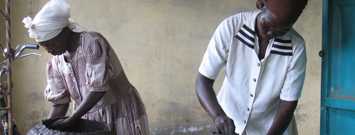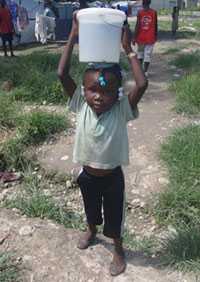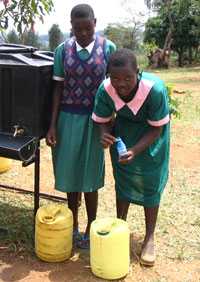NOTICE: This web page has been archived for historical purposes. Its content is no longer maintained, so information may be out of date and links may not work properly. For current Healthy Water features, please see the Newsroom, Features, & Observances page.
Learn about World Water Day 2013
 Learn about the 2013 World Water Day theme of water cooperation, which is a foundation for peace and sustainable development.
Learn about the 2013 World Water Day theme of water cooperation, which is a foundation for peace and sustainable development.
Each year on March 22, World Water Day attracts international attention to the conservation and development of freshwater resources.
 In December 2010, the United Nations General Assembly declared 2013 as the United Nations International Year of Water Cooperation. The Water Cooperation 2013 campaign aims to promote water cooperation—across different types of organizations and governments and across different disciplines—as a foundation for peace and sustainable development.
In December 2010, the United Nations General Assembly declared 2013 as the United Nations International Year of Water Cooperation. The Water Cooperation 2013 campaign aims to promote water cooperation—across different types of organizations and governments and across different disciplines—as a foundation for peace and sustainable development.
CDC works hand-in-hand with partners around the world to improve access to healthy water because:
- Water cooperation is key to poverty eradication, social equity, and gender equality. Access to safe water is a basic human need. Participation and cooperation among different groups can help to overcome inequity in access to water, contribute to poverty eradication, and improve living conditions and educational opportunities, especially for women and children.
- Water cooperation creates economic benefits. All economic activities depend on water. Working together can lead to more efficient and sustainable uses of water resources, such as projects that create mutual benefits and better living standards.
- Water cooperation is crucial to preserving water resources and protecting the environment. Cooperation helps the sharing of knowledge about the scientific aspects of water, including data and information exchange, management strategies and best practices, and knowledge about the role of water in preserving ecosystems, which is fundamental to sustainable development.
- Water cooperation builds peace. Access to water can be a source of conflicts, but it can also lead to teamwork and peace building. Cooperation on such a practical and vital issue can help overcome cultural, political and social tensions and can build trust among different groups, communities, regions, and states.
For more information on World Water Day and ideas on how to get involved, visit the United Nations' World Water Day website.
CDC's Global Water, Sanitation, and Hygiene (WASH) Expertise
 Inadequate water, sanitation, and hygiene (WASH) conditions exist in a range of settings, from temporary refugee camps to entire neighborhoods in large cities.
Inadequate water, sanitation, and hygiene (WASH) conditions exist in a range of settings, from temporary refugee camps to entire neighborhoods in large cities.
Since 1990, the number of persons able to access improved drinking water and sanitation resources has increased by 2 billion and 1.8 billion respectively 1. Despite these gains, hundreds of millions still lack access to these essential resources 1. Diarrheal diseases, mostly a result of unsafe water and inadequate sanitation, account for 1 in 9 child deaths worldwide. In 2010, over 800,000 children under 5 years of age died from diarrhea, making diarrhea the second leading cause of death among children under the age of 5 2.
CDC's global WASH work involves partnerships with other US government agencies, ministries of health, non-governmental organizations, UN agencies, private companies and various international agencies. Our program provides expertise and interventions aimed at saving lives and reducing illness by improving global access to healthy and safe water, adequate sanitation, and improved hygiene. The WASH program works on long-term prevention and control measures for improving health, reducing poverty, and improving socioeconomic development as well as responding to global emergencies and outbreaks of life-threatening illnesses. These improvements reduce the lethal impact of WASH-related diseases ranging from cholera to typhoid fever to hepatitis.
For more information on CDC's Global WASH Program, visit the CDC at Work section of our Global WASH website.
More Information
- World Water Day
- CDC's Global Water, Sanitation, and Hygiene Website
- CDC's Safe Water System
- CDC's Environmental Health Global Water, Sanitation, and Hygiene Website
- CDC's Global Disease Detection and Emergency Response Website
- CDC and the U.S. Global Health Initiative
- CDC's Healthy Water Website
References
- United Nations Children's Fund (UNICEF), World Health Organization. Progress on drinking water and sanitation: 2012 update. New York, NY: UNICEF, World Health Organization.
- CDC. Global Diarrhea Burden.
CDC works 24/7 saving lives and protecting people from health threats to have a more secure nation. A US federal agency, CDC helps make the healthy choice the easy choice by putting science and prevention into action. CDC works to help people live longer, healthier and more productive lives.
Get email updates
To receive email updates about this page, enter your email address:
Contact Us:
- Centers for Disease Control and Prevention
1600 Clifton Rd
Atlanta, GA 30333 - 800-CDC-INFO
(800-232-4636)
TTY: (888) 232-6348 - Contact CDC–INFO
 ShareCompartir
ShareCompartir


